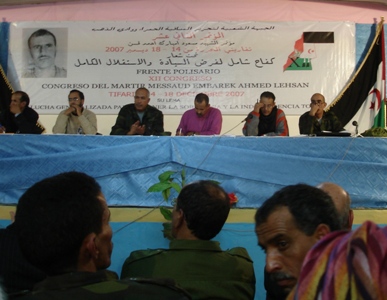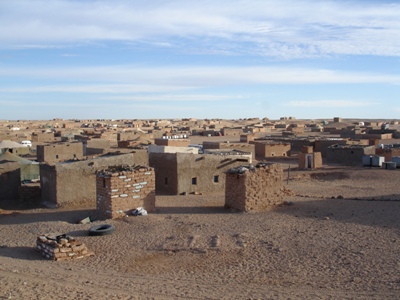For 17 years the people of Western Sahara have waited for a solution to the territorial conflict with Morocco. The promise to give the Sahrawies a possibility to decide over their future through a referendum has not been kept. Polisario, Western Sahara´s independence movement, is considering leaving the negotiation table and returning to war (14-JAN-08).
By Tom C. Varghese, Øystein Skotheim and Jonas Weltan, Rafto Foundation
Published by Gunta Venge / Rafto Human Rights House. Photos: Rafto Foundation
 The possibility of an armed continuance of the conflict between Morocco and Polisario was heavily debated at the twelth Congress Polisario, taking place at Tifariti in the liberated zone of Western Sahara from 14-18 of December. Three delegates (left) from the Rafto Foundation, authors of this article, were present at the congress. The Saharawi people have ever since 1991 adhered to a nonviolent struggle for self-determination and independence. As the situation is deteriorating, both in the occupied territories as well as in the refugee camps in the Algerian desert, the people feel a need for change in tactics to achieve their goal.
The possibility of an armed continuance of the conflict between Morocco and Polisario was heavily debated at the twelth Congress Polisario, taking place at Tifariti in the liberated zone of Western Sahara from 14-18 of December. Three delegates (left) from the Rafto Foundation, authors of this article, were present at the congress. The Saharawi people have ever since 1991 adhered to a nonviolent struggle for self-determination and independence. As the situation is deteriorating, both in the occupied territories as well as in the refugee camps in the Algerian desert, the people feel a need for change in tactics to achieve their goal.
 Polisario´s general secretary, Mohamed Abdelaziz (left), stated at the congress that he does not want a military solution. However, he warned that if Polisario were to be forced to resume the armed struggle, it would bring with it a fierce war of incalculable consequences for the stability of the entire region. As international delegates and the media left the congress after two days, intense discussions among the Polisario representatives prolonged the congress an additional 48 hours. According to Polisario spokesperson Mhamed Khadad, the result was a decision to meet again in six months, when a final decision on taking arms will be determined.
Polisario´s general secretary, Mohamed Abdelaziz (left), stated at the congress that he does not want a military solution. However, he warned that if Polisario were to be forced to resume the armed struggle, it would bring with it a fierce war of incalculable consequences for the stability of the entire region. As international delegates and the media left the congress after two days, intense discussions among the Polisario representatives prolonged the congress an additional 48 hours. According to Polisario spokesperson Mhamed Khadad, the result was a decision to meet again in six months, when a final decision on taking arms will be determined.

Ahead of the congress, Moroccan government officials addressed the gathering at Tifariti as illegal, urging the UN to prevent it from taking place. It was explicitly claimed that Western Sahara poses an immediate threat to the stability of the Maghreb region as a whole. These words were spoken just three weeks before this week´s Manhasset negotiations between Morocco and Polisario, making constructive developments between the two adversaries even harder to reach. Last week´s negotiations form the third round of talks since June.
The 12th Polisario Congress
So far the previous talks have not been fruitful. The Saharawi people now await the outcome of these negotiations, but with low expectations. In the refugee camps that house over 165 000 people, they are completely dependent on international humanitarian aid. However, it is the atmosphere of apathy that makes the strongest impression. Many sahrawies have spent most of their lives in the camps, and the future that awaits them can not promise change. An even worse situation faces those who reside in the Moroccan occupied areas of Western Sahara. Reports from human rights organisations describe the use of forced disappearances, torture during interrogations, detention of political activists, deportations, censorship, and a lack of fair trails.
 The hope of a lasting solution to the conflict has slowly been fading, while the status quo has been growing increasingly acceptable to the international community. The voices of 165 000 in the desert, just seem to drown in the sand. Asking a Polisario representative what he expects from the upcoming negotiations with Morocco, the answer is frank: “Nothing. This is simply the next nothing.”
The hope of a lasting solution to the conflict has slowly been fading, while the status quo has been growing increasingly acceptable to the international community. The voices of 165 000 in the desert, just seem to drown in the sand. Asking a Polisario representative what he expects from the upcoming negotiations with Morocco, the answer is frank: “Nothing. This is simply the next nothing.”
The 27th February refugee camp


